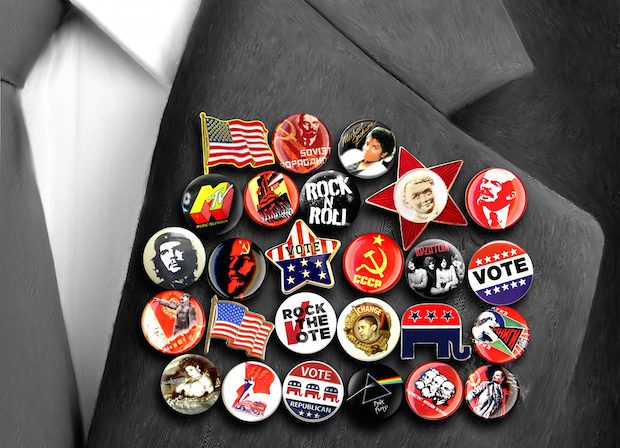How Lenin Beat Reagan

I was around 16 years old the last time I wore a lapel pin: an AC/DC “Let There Be Rock” button that I bought at a head shop along with a couple of vials of amyl nitrite. Such is the level of sophistication I associate with declaring oneself in sartorial shorthand. But before long I decided, or at least hoped, I contained multitudes that couldn’t be expressed in the span of a lapel, so I tossed out my AC/DC button with the last of the poppers.
Several years later, while in college, I traveled to the USSR for a summer study program and was amused by the Soviet mania for znachki: that is, lapel pins. Not content with the already broad politicizing of Soviet life—sports, science, literature, history, art, industry, most public spaces—the party had all but nationalized the folds of everyday clothing. And several of my American travel mates loved it, however ironically. The znachok (singular) they most eagerly sought on the black market was the “baby Lenin,” purported to be a grainy photo of the infant dictator, but they could be satisfied with hammer-and-sickles, anything space-age Cyrillic, and images of the bearded Lenin pointing the way to the socialist future.
It wasn’t lost on anyone―certainly not the average Russian―what an all-around joke this was. While we were buying up nationalist kitsch that the Russians themselves had stopped taking seriously, they desired, in exchange, anything Western. Anything. I paid for cab rides with Marlboros, swapped old Nikes for a Russian Republic flag, old Levi’s for a Red Army belt and buckle. Michael Jackson and Madonna tapes could fetch great returns, as could packages of tampons or condoms—which, while not strictly Western, were hard-to-obtain commodities. All the trappings of Soviet glory had ended up, if not in the ash heap of history, at least in the bargain bin. The Cold War seemed to have been won on the playing fields of the average American strip mall.
The year was 1988, and my group’s arrival closely followed President Reagan’s valedictory trip to Moscow—at which he retracted his “Evil Empire” remark of years earlier. That Reagan was an eternally boyish ex-actor who went in for a Southern California aesthetic and, even as chief executive, derided his own country’s government seemed to point out our invincibility. It was the triumph of style over substance: both Soviet ideological substance—the one thing the USSR had in surplus, crushingly so—and that of Reagan’s own right-wing critics, who were denouncing him as a dupe for supposedly having compromised American security in the face of Russian guile.
Russians, raised on a steady diet of Soviet exceptionalism and “creaking camaraderie” (Orwell’s phrase), could conceive of no effective opposition to such dynamic dysfunction as America presented. Tanks, slogans, and ICBMs were useless against “Like a Virgin” cassettes and boxes of rubbers brought into the country by unwashed American undergrads whose criticisms of their own government were little different in kind from their head of state’s. The moral of the story was not so much that our brand of patriotism, our brand of ideology, was superior. Rather it was that we largely eschewed such things, or kept them to a decent minimum, lest they bog us down in the sort of ritualistic affirmations we so readily mocked in the Soviet bloc. 
So it’s ironic that in the 25 years since the USSR went poof, and especially in the dozen-plus years since 9/11, the American right has increasingly adopted the style of the old Soviet Union, starting with the znachki. Reagan didn’t wear a flag lapel pin―not when debating Carter, not when debating Mondale, not when negotiating with Gorbachev. Outside the circus atmosphere of a political convention, virtually no one wore flag lapel pins back then. Nowadays they’re nearly compulsory in political circles and are a common enough sight on everyone from newsreaders to sportscasters to talk-show hosts: a society-wide assimilation of nationalist kitsch worthy of the USSR and, accordingly, so perfunctory as to have meaning only in absence.
Then there’s the pure, uncut tovarishch talk of “you’re a great American,” the salutation Sean Hannity exchanges with favored guests and callers on his radio show. His book covers, too―with their abundance of reds, whites, and blues, and titles like Let Freedom Ring and Deliver Us From Evil―are enough to make one appreciate the graceful understatement of old Socialist Realist propaganda.
And one can’t avoid mentioning Fox News when discussing Orwellian uses and abuses of language. The mock-heroic “Fair, Balanced, and Unafraid” and “No-Spin Zone” are splendid examples of Ministry of Truth doublethink, insofar as you’re supposed to believe them and not believe them at the same time: believe them because they proclaim noble ideals and not believe them because if you’re a typical Fox News viewer you tune in precisely because you’re sure to encounter a gratifying and unembarrassed partisanship—sometimes known as spin—delivered with patriotic-hued backdrops, exhilarating denunciations of enemies of the state both without and within, and of course, flag lapel pins.
Part of Fox News’s charm, however, is that the network has set itself up as a kind of government in exile―defending the faith on a cable redoubt from which it can conveniently deprecate as un-American anything the actual American government does or doesn’t do. Hence Fox’s sensibility: a heady cross-purposing of Radio Free Europe and old-school Vremya. This seeming paradox, though, has roots that predate the Eisenhower administration, as Mary McCarthy, confessed anticommunist, noticed in 1952 in that year’s response to the country’s perennial Red anxieties: “The strange thing is that this current indoctrination for democracy has very much the same tone―pious, priggish, groupy―that we objected to in the Stalinism of the popular-front period.” The tone is no less successful now.
Where Orwell is concerned, however, it’s not really 1984 but rather his 1945 essay “Notes on Nationalism” that gets nearest the tenor of the times and best captures the paradox of ardent democrats sounding like New Soviet Men. Orwell applies the term “nationalist” less to jingoes from this or that geopolitical entity and more to a habit of mind whose main identification might be ideological, racial, religious, or based, for instance, on party or class. Whatever the affiliation,
A nationalist is one who thinks solely, or mainly, in terms of competitive prestige. He may be a positive or a negative nationalist—that is, he may use his mental energy either in boosting or in denigrating—but at any rate his thoughts always turn on victories, defeats, triumphs and humiliations. He sees history, especially contemporary history, as the endless rise and decline of great power units…
Given a zero-sum state of mind, every day is an existential crisis, and foes foreign and domestic will always be found who must be vanquished—or, almost better, perennially and definingly opposed lest, for example, you push so hard against the Iron Curtain that one day it falls down and you get up covered in znachki.
Orwell reiterates that nationalism “may work in a merely negative sense, against something or other and without the need for any positive object of loyalty.” Dovetailing with this idea of negative nationalism is the seemingly contradictory coupling of explicit, almost fetishistic patriotism and reflexive disdain for the American government and much of the country’s culture, despite which disdain we’re enjoined to keep unapologetically in mind how exceptional and indispensable we are, how only we—whether by example or by force—can bring the light of reason to a cussed world. Somehow, although Fox-type patriots deem the U.S. incapable of executing domestic postal duties without botching the job, Uncle Sam should be thought competent to superintend tortuous political, religious, and tribal complexities abroad. This forms part of an inverted political-emotional calculation whereby the degree to which you denigrate America as it actually exists becomes a measure of how much you love it in the abstract, and ceaselessly claiming that America doesn’t work in practice somehow lends credibility to the assertion that it could still work in theory.
“Acutely conscious of the disarray into which American culture has fallen,” Andrew Bacevich wrote in 1998, “neoconservatives remain intensely nationalistic. (Indeed, neoconservative writers sometimes hint that a glorious crusade in a noble cause might be just the thing to reinvigorate the flagging sense of American identity.)” Five years later, while making sure not to let a good crisis go to waste, we set out with preposterous optimism to democratize the Middle East at sword point, though Bacevich had foreseen that our “idealism and high-mindedness … may prove to be a singularly reckless proposition.”
It is this idealism and high-mindedness that has allowed a nation of self-styled reluctant warriors to be one of the great destabilizers of the past 100 years, guided by a Wilsonian philosophy of transformative internationalism that is hostile to balances of power and spheres of influence and dedicated to aggressive advocacy of national self-determination, however defined, except in the numerous cases when―taking the entire world as our own sphere of influence―we’ve intervened to reshape others’ determination. It was said of Woodrow Wilson himself by one of his colleagues that he was full of “high ideals but no principles.” Comparing Wilson’s legacy with that of his fellow champion of universal social renewal, Lenin, the historian John Lukacs, writing for National Review in 1974, noted that on that score “Wilson is overtaking Lenin.”
We’ve managed to out-Lenin Lenin as the most activist, revolutionary force on the planet, one that’s ever anxious to shape world events and often successful in doing so. Whether that’s something to be glad of, something that will continue to enhance our security and prosperity, is another matter. As the descendants of Lenin could attest, revolutions—homegrown or exported—don’t always follow paths of one’s choosing. The question is then whether the unintended consequences of past involvements become a pretext for further involvements, whose consequences spur yet further involvements—permanent revolution.
Jon Zobenica’s writing has appeared in The Atlantic, The American Scholar, and The New York Times Book Review.